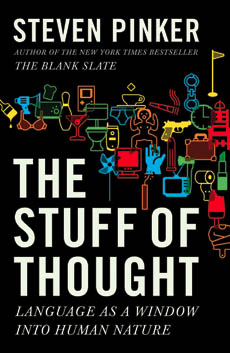It’s All The Stuff of Thought
for Steven Pinker
Expletives, ComeOns, and Quirks

Nobody can accuse cognitive scientist Steven Pinker, best known as the author of How the Mind Works, of lacking ambition. The Harvard professor of psychology is not only tireless in asking probing questions about language and human behavior; he also makes bestselling tomes out of the answers. Pinker’s recently released The Stuff of Thought investigates how what we say exposes the way we think. I caught up with Pinker over the phone to discuss words, ideas, and his upcoming visit to Santa Barbara.

“Language reveals that we carve reality into categories useful to our purposes,” Pinker enthusiastically explained. “We seek the causes of events; we conceive of them like billiard balls impinging on one another. We divide space into regions. We’re prone to strong negative emotions about topics like sexuality, the divine, excretion, death, and disease. We’re very touchy about social relationships and veil our words in ways to negotiate or maintain them. We use metaphor to grapple with abstract concepts. When we name things, we hope our community labels them in the same way. When we name our children, we try to be distinctive, but not too distinctive.” Clearly, The Stuff of Thought suffers no lack of subject material.
While many popular science authors strain to relate to the lay reader, Pinker, in dealing with ordinary language, covers ground familiar to everyone: curses, euphemisms, prepositions, and-his favorite-plain old verbs. “Readers will gain insight on life, like when they read a book on evolution, geology, or astronomy, like how they see the Milky Way differently when they know it’s the arm of a galaxy rather than just a smear. I hope they’ll see swearing, politeness, baby names, and metaphors differently when they realize these aspects of language reveal what makes us tick. Engaging in legal disputes, diplomacy, or come-ons, they’ll be less likely to be taken in and more likely to appreciate what people accomplish with weasel words.”
The constructions of words and phrases we use daily may receive little scrutiny, but Pinker argues they deserve disassembly and careful study. “Think about indirect speech and politeness,” he suggested. “When you listen, you realize that sentences like ‘If you could pass the salt, that would be awesome,’ are both common and illogical. You notice quirks, like saying something is ‘under water’ when it really isn’t. But it’s not the fact that language has quirks that’s important; it’s that the quirks have a hidden logic.”
Deciphering this hidden logic is The Stuff of Thought‘s mission, one whose complexity Pinker hadn’t fully grasped at first. “Why is asking a date to ‘come up to your apartment’ code for sex? I thought there would be a simple answer, but it was a tough nut to crack. It’s easy to fool yourself that you understand. Why is it socially awkward to just blurt out things? You want to save face, sure, but what exactly is face? Why do you start talking about feces or sexuality when you spill beer on your lap? It’s not obvious.”
Pinker’s previous volume, The Blank Slate, raised controversial questions about human capability; as far as he is concerned, when it comes to science, there is no question you can’t ask. “If people treat an idea as unacceptable, it usually [takes] one thought to challenge an important moral. People confuse the scientific question, morphing the claim that men and women aren’t statistically identical into the claim that women shouldn’t be encouraged in science, while the right thinks evolution questions whether there’s a higher purpose.” Will his latest book provoke similar debate? “There are plenty of scientific controversies in there,” Pinker said, “but they won’t be political.”
4•1•1
Steven Pinker will discuss The Stuff of Thought on Saturday, September 29, at Victoria Hall Theater (33 W. Victoria St.) at 4 p.m. The lecture is free to the public. Call 893-3535 or visit artsandlectures.ucsb.edu.



